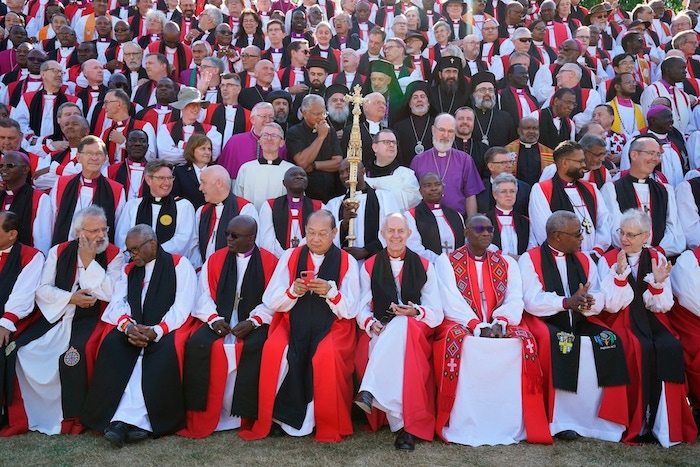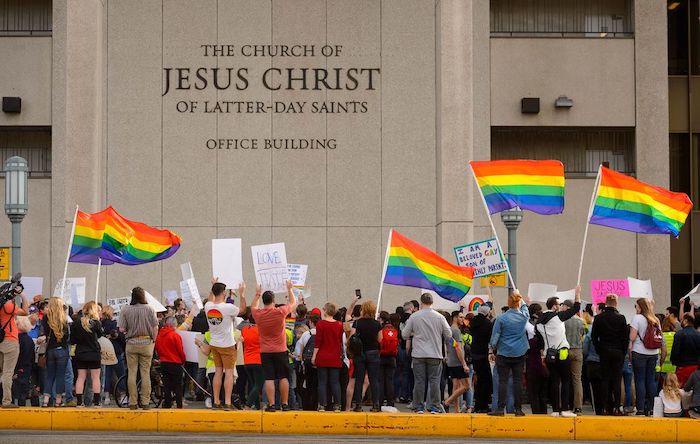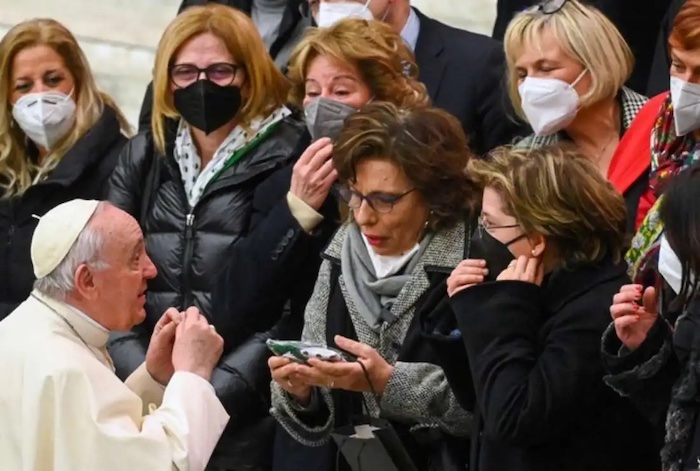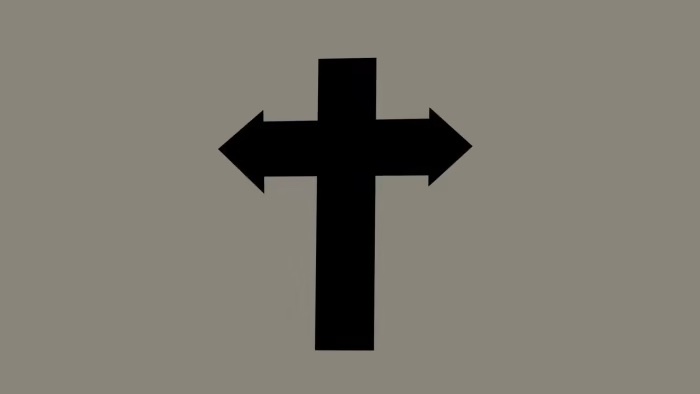
By Associated Press
Friction has been simmering within the global Anglican Communion for many years over its 42 provinces’ sharp differences on whether to recognize same-sex marriage and ordain LGBTQ clergy. This year, the divisions have widened, as conservative bishops – notably from Africa and Asia – affirmed their opposition to LGBTQ inclusion and demanded “repentance” by the more liberal provinces with inclusive policies.
Caught in the middle of the fray is the archbishop of Canterbury, Justin Welby, who is the top bishop of the Church of England and ceremonial leader of the Anglican Communion, which is one of the world’s largest Christian communities. Welby has acknowledged “deep disagreement” among the provinces, while urging them to “walk together” to the extent possible.
The divide came into the spotlight four months ago at the communion’s Lambeth Conference, typically held once every decade to bring together bishops from the more than 165 countries with Anglican-affiliated churches. It was the first Lambeth Conference since 2008, and the first to which married gay and lesbian bishops were invited.
The conservative primates of Nigeria, Rwanda and Uganda refused to attend, while other bishops who share their opposition to LGBTQ inclusion pushed unsuccessfully for the Lambeth gathering to reconfirm a 1998 resolution rejecting same-sex marriage.
Now those primates, and their allies worldwide, are looking ahead to a conference in Kigali, Rwanda, in April. They’re expected to discuss their dismay at support for same-sex marriage in some Anglican churches and what they see as Welby not taking a tough stand against such marriages.
Welby, in turn, says neither the Lambeth Conference nor he individually has the authority to discipline a member province or impose demands on it.
In Nigeria, Anglican leaders say a formal separation from the global church over LGBTQ inclusion is more likely than ever. They cite Welby’s comments at Lambeth and the subsequent appointment of the Very Rev. David Monteith – who has been part of a same-sex civil partnership since 2008 – as the new dean of the Canterbury cathedral.
Bishop Williams Aladekugbe of Nigeria’s Ibadan North Anglican Diocese said same-sex unions are “ungodly and devilish” and their recognition by some provinces is a major reason “we cannot continue to fellowship with them.”
“If it is going to cause further division, let it be,” Aladekugbe told The Associated Press. “If they don’t worship God the way we worship him, if they don’t believe in what we believe in… let us divide (and) we go our own way.”
Henry Ndukuba, primate of the Anglican church in Nigeria, cited such divisions during an interview with a church-run television network.
The archbishop of Canterbury “is a symbol of unity” in the Anglican Communion, Ndukuba said, but “because of the way things are going, we are not tied to the apron of Canterbury.”
The umbrella group for the conservative bishops is the Global South Fellowship of Anglican Churches (GFSA). Its steering committee is headed by South Sudan Archbishop Justin Badi, and includes archbishops from Bangladesh, Chile, Congo, Egypt, the Indian Ocean region and Myanmar.
At the Lambeth Conference, the committee issued a stern communique – in effect demanding their views on LGBTQ issues hold sway throughout the Anglican Communion and that the “revisionist” provinces be disciplined or marginalized.
That threat was aimed at the provinces which have embraced LGBTQ-inclusive politics – including the Episcopal Church in the United States, and the Anglican churches of Brazil, Canada, New Zealand, Scotland and Wales. For now, the Church of England refuses to conduct same-sex marriages, but some of its bishops want that policy to change.
The GFSA leaders contend that conservative-led jurisdictions are home to 75% of the global Anglican Communion population, which is estimated at 80 to 85 million.
“For too long the Anglican Communion has been driven by the views of the West,” Badi told news media during the conference. “We often feel that our voice is not listened to, or respected.”
In their communique, Badi and his allies stressed they are not defecting. Yet they questioned whether the global Anglican community, under current circumstances, could consider itself a truly unified body.
“If there is no authentic repentance by the revisionist Provinces, then we will sadly accept a state of ‘impaired communion’ with them,” the communique said.
Welby, instead of reprimanding the LGBTQ-inclusive provinces, commended the sincerity of their approach to human sexuality.
“They are not careless about scripture. They do not reject Christ,” Welby said at Lambeth. “But they have come to a different view on sexuality after long prayer, deep study and reflection on understandings of human nature.”
The Most Rev. Michael Curry, presiding bishop and primate of the Episcopal Church, saw this as a breakthrough.
“What shifted in the rhetoric,” he said, “was a genuine acknowledgement that both sides had arrived at their views through serious study of scripture, theology, and modern understanding of human nature.“
The Rev. Chuck Robertson, a top aide to Curry whose dossier includes relations with the Anglican Communion, described Welby’s comments as “a game-changer.”
“It reflects that those who’ve been going beyond traditional teaching have done so with deep care,” Robertson said. “This is something new — a corner had been turned.”
The conservative bishops’ frustrations with Welby intensified in October when Monteith was appointed the new dean of the Canterbury cathedral.< While Welby did not personally make the appointment, he issued a statement expressing delight at the choice made by a selection panel. Within days, the GSFA steering committee conveyed its dismay. The announcement “puts in question the seriousness with which (Welby) wants to pursue the unity of the Communion,” the committee said. “We take exception to the Church of England’s accommodation of a person in a same-sex union being appointed to an office of spiritual authority over the flock of God’s people.” A Rwandan bishop, Alexis Bilindabagabo of the diocese of Gahini, said he condemns the ordination of gay priests because “weak” people shouldn’t stand at the pulpit. “A gay man must be led, but he should not lead others,” said Bilindabagabo. LGBTQ activists say most Anglican churches in Africa are led by conservative priests, including many averse to even discussing homosexuality. “For Uganda, the Anglican church has almost played a leadership role in being intolerant,” said Frank Mugisha, a prominent LGBT leader in the East African country where a lawmaker once introduced legislation seeking to punish some homosexual acts with execution.
In some cases, Mugisha said, Anglican priests take a hard-line stance because they fear losing their flock to more conservative evangelical groups.
In contrast to other Anglican provinces in Africa, the Anglican Church of Southern Africa has considered letting dioceses conduct same-sex marriages, though it has yet to take that step.
The church is based in South Africa – the only African country to legalize such unions – and also represents dioceses in several neighboring countries. It was led for many years by the late Archbishop Desmond Tutu, who was a staunch advocate of LGBTQ rights well as leading foe of apartheid.
The Southern Africa church has been critical of Anglican leaders elsewhere on the continent who support harsh laws against LGBTQ people.
“It is evident that some of the draconian laws in some African countries are in fact violations of human rights and some bishops of the Anglican Church in these countries have openly supported these laws,” said Bishop Allan Kannemeyer, who heads the Diocese of Pretoria.
It’s unclear what lies ahead for the Anglican Communion. The GSFA leaders, in their October statement, say that if Welby does not take the lead in “safeguarding the Church’s teaching,” there may be an opening for conservative bishops to increase their influence.
That topic will likely be paramount at the April meeting in Rwanda, to which GSFA bishops have been invited. It will be hosted by the Global Anglican Future Conference – known as Gafcon – which includes the archbishops of Nigeria, Rwanda and Uganda, as well as leaders of conservative Anglican entities that already have split from the Anglican Communion, such as the Anglican Church in North America.
No one from the Anglican Communion’s head office in London is expected to attend.
“Some in Gafcon see it as a movement for biblical renewal, which is fine, but others as a rival to the Anglican Communion,” said Gavin Drake, the communion’s communications director. ‘There is a growing frustration within the Communion at this ‘political wing’ of Gafcon.”
By the time they meet in April, Gafcon and GFSA members might be further angered by events within the Church of England, whose General Synod will gather in February to consider proposals on same-sex marriage developed during a lengthy discussion process. There’s a possibility of an unprecedented vote allowing Church of England priests to conduct same-sex weddings for the first time.
A significant development came in early November, when Steven Croft, the bishop of Oxford, became the church’s first diocesan bishop to speak in favor of same-sex marriage. He published a 50-page essay urging a lifting of the ban and sent it to all members of the College of Bishops.
At stake, he said, was the Church of England’s claim to serve the whole of society. Its anti-LGBTQ stance “is leading to a radical dislocation between the Church of England and the culture and society we are attempting to serve,” he said.
Five other Anglican bishops have publicly backed Croft’s call for change.
Complete Article ↪HERE↩!






